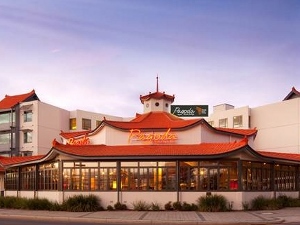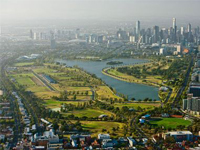
Holiday at home, Aussies urged, as sector fights “heartbreaking” devastation
‘Holiday Here This Year’ is the message of a new Tourism Australia campaign pushing Aussies to help rebuild domestic tourism in the wake of the summer bushfires.
The campaign, launched just days after the Government dedicated $20 million to promoting domestic tourism, comes as tourism operators in fire-affected regions are crying out for practical help to try and salvage something from a disastrous season.
All states and territories have pledged to support the campaign, Tourism Australia managing director Phillipa Harrison describing it as practical way for Australians to help by filling accommodation properties across the country.
The targeting of money into tourism campaigns and interest-free loans rather than handouts and practical travel inducements has been criticised in some quarters, despite broad industry support for government tourism recovery package and holiday at home campaign.
Narooma Marina operator Peter Hay told AccomNews this week: “Small business doesn’t need interest free loans or tourism marketing they need help right now to be able to ride out the loss of income.”
Another operator told us: “Tax incentives to travel now is the perfect idea. Stimulate travel and business now! The money spent on the campaign is a message we already know. We don’t need a logo and a jingle.”
But industry bodies have welcomed the Holiday Here this Year push, Tourism Accommodation Australia CEO Michael Johnson saying: “Having recently visited fire affected tourism areas in the Blue Mountains and Hunter Valley, I realise first-hand how badly this campaign is needed.
“The message is simple – holiday in your own back yard this year and help support regions that need it most.”
The Accommodation Association has described the campaign as a “critical first step”, CEO Dean Long saying “the speed of the Federal Government’s announcement and subsequent release of funds has allowed Tourism Australia to move quickly and start the process of rebuilding our sector”.
He said the association had been working with the government to limit the impact of cancellations and brand damage to the sector.
“To date our members have advised of losses of more than $550 million in direct cancellations since late December,” Long said.
“We know Australians are seeking ways to support affected communities and we believe this campaign will encourage more Australian’s to prioritise a holiday at home.”
Individual organisations are launching their own initiatives in response to the bushfire crisis, the Caravan Industry Association of Australia urging travellers to visiting fire-affected areas and providing up-to-date information on campgrounds through its new ‘Keep on Camping’ website.
Caravan parks in the South Coast of NSW and the Gippsland regions account for the largest market share of all commercial accommodation nights in the regions, at 38 percent and 42 percent.
CEO Stuart Lamont said: “The devastation that we have seen due to bushfires is heartbreaking.
“Many of the affected areas should be in absolute peak season brimming with tourists, and yet whole regions remain closed with some caravan parks suggesting they may be weeks before re-opening.
“Once these affected areas re-open, the need for tourist visitation will be vital to assisting these communities and businesses to start the long process of getting back on their feet.”
The Australian Tourism Industry Council now puts the immediate domestic impact of the fires at $2 billion, factoring in the loss of business revenue, forward sales and the physical damage to tourism facilities and assets.
“Australia is not immune to natural disasters but the concentration of these bushfires, combined with the spread and concentration of media and social media activity compromising our global brand, has taken this crisis to a different level,” said ATIC executive director Simon Westaway.
“It has certainly been the worst summer in living memory and arguably it’s been the worst summer ever for Australian tourism.”
Tourism Australia will use print, social media, billboards, radio and outdoor advertising to try to inspire locals to travel to regional areas.
The Australian Tourism Export Council praised the speed of campaign implementation, managing director Peter Shelley saying: “This campaign has been quick off the blocks and will work to capitalise on the good will and sentiment shared by all Australians in helping to get the communities affected by bushfires back on their feet.”
Mr Shelley warned the bushfires have had a severe impact on the international perception of Australia as a travel destination, with a 40 percent reduction in forward bookings from Western markets including the UK, Europe and the US, and a 20 percent decline across all international markets.
“People looking to visit Australia have been spooked,” he said.
“While this domestic campaign is a great first step, we are keenly anticipating the next stage of the recovery campaign and its focus on rebuilding brand Australia for our international audience.”

AccomNews is not affiliated with any government agency, body or political party. We are an independently owned, family-operated magazine.







Sadly I want to throw up reading most of this, Tourism leaders behaving like nodding donkeys and rubber stamps for the government having not looked outside the square on the critical needs of Australias regional tourism
I wonder what the KPI is for this campaign ?
From Sue Mornane of Rum Jungle Bungalows.
We at the Bungalows totally empathise and sympathise deeply with the devastation of all those who have lost loved ones, animals, properties, environments and natural habitats in all the areas of Australia which have been directly affected by the bushfires.
We are also very sorry for those people and businesses in close proximity to those areas who will also suffer loss of income as a result of these fires and rather than this incredible mega-spend on ‘advertising’ by Tourism Australia, the money allocated by Government would have been better allocated directly to the affected businesses (in a number of ways), enabling them to ’remain and stay’, saving their ‘product’ , ensuring there are still business in those areas in the future for the time when the visitors do actually return.
We in the Top End only receive a small percentage of the total number of national travellers and international tourists to Australia and even in the best of our short tourist season, things are not easy up here. The cancellations and down-turn of the number of visitors coming into Australia will have a real financial effect on us in the Top End, even though “we are open for business”, but the effect will be nothing like those in the areas directly and indirectly affected in all those regions.
To everyone, we extend our genuine empathy and sincerest wishes for hope and recovery from your suffering and unbelievable losses.